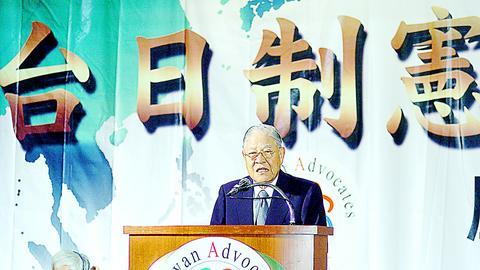Former president Lee Teng-hui (
But after offering this blunt criticism, Lee toned down his disapproval of Chen's speech, saying that he understood Chen's difficulty because he had also said "the Republic of China is on Taiwan" when he was the president, and "this is the way things are," Lee said.

PHOTO: YEH CHIH-MING, TAIPEI TIMES
Lee made the remarks during a symposium in which many Japanese and Taiwanese academics discussed the evolution and development of the constitutions of Taiwan and Japan and the stability and security of Asia, held by the group Taiwan Advocates yesterday. Lee gave a speech entitled "Only if Taiwan makes a new constitution can the stability and security of Asia be permanently assured."
During his speech, Lee refuted Chen's position as outlined in his National Day speech that "the Republic of China is Taiwan, and Taiwan is the Republic of China" as rhetoric that "deceived himself as well as others."
"Besides, there was no `1992 consensus.' I was the president at that time and I knew there was no such thing," Lee said.
As Taiwan's president for 12 years, Lee said that he deeply believed that the concept of a "Republic of China" was simply a case of the "emperor's new clothes," designed to cheat the people of Taiwan.
"No one in international society knows what `Republic of China' is," Lee said.
"If the people of Taiwan continue to be limited to the context of `Republic of China,' Taiwan will neither join the international community nor resolve the instability in the Taiwan Strait," Lee continued. "If the people of Taiwan don't terminate this abnormality of Taiwan by making a new constitution, and choose to escape from reality with the excuse of maintaining the `status quo,' it will be an irresponsible attitude for ourselves, our descendants and the peace and stability of Asia."
Lee said that the Constitution of the Republic of China does not meet the present conditions of Taiwan, and only traps Taiwan into the legal snare of "one China."
Lee stressed that the Republic of China maintains the "one China" system in jurisprudence, and thus emboldens China to invade Taiwan thereby threatening to spark the biggest crisis in the region.
"China will continue to take advantage of such legal snares and will disseminate propaganda to the international society that the Taiwan issue is an internal affair of China, which will eventually subject Taiwan to China's military threat," Lee said.
The fundamental solution to protect Taiwan from the threat of China is to create a believable and reasonable constitution for Taiwan, Lee said, adding that he anticipates achieving this goal by 2007.
Lee also suggested that Taiwan be ruled under a three-branch system (

DAREDEVIL: Honnold said it had always been a dream of his to climb Taipei 101, while a Netflix producer said the skyscraper was ‘a real icon of this country’ US climber Alex Honnold yesterday took on Taiwan’s tallest building, becoming the first person to scale Taipei 101 without a rope, harness or safety net. Hundreds of spectators gathered at the base of the 101-story skyscraper to watch Honnold, 40, embark on his daredevil feat, which was also broadcast live on Netflix. Dressed in a red T-shirt and yellow custom-made climbing shoes, Honnold swiftly moved up the southeast face of the glass and steel building. At one point, he stepped onto a platform midway up to wave down at fans and onlookers who were taking photos. People watching from inside

A Vietnamese migrant worker yesterday won NT$12 million (US$379,627) on a Lunar New Year scratch card in Kaohsiung as part of Taiwan Lottery Co’s (台灣彩券) “NT$12 Million Grand Fortune” (1200萬大吉利) game. The man was the first top-prize winner of the new game launched on Jan. 6 to mark the Lunar New Year. Three Vietnamese migrant workers visited a Taiwan Lottery shop on Xinyue Street in Kaohsiung’s Gangshan District (崗山), a store representative said. The player bought multiple tickets and, after winning nothing, held the final lottery ticket in one hand and rubbed the store’s statue of the Maitreya Buddha’s belly with the other,

‘NATO-PLUS’: ‘Our strategic partners in the Indo-Pacific are facing increasing aggression by the Chinese Communist Party,’ US Representative Rob Wittman said The US House of Representatives on Monday released its version of the Consolidated Appropriations Act, which includes US$1.15 billion to support security cooperation with Taiwan. The omnibus act, covering US$1.2 trillion of spending, allocates US$1 billion for the Taiwan Security Cooperation Initiative, as well as US$150 million for the replacement of defense articles and reimbursement of defense services provided to Taiwan. The fund allocations were based on the US National Defense Authorization Act for fiscal 2026 that was passed by the US Congress last month and authorized up to US$1 billion to the US Defense Security Cooperation Agency in support of the

‘COMMITTED TO DETERRENCE’: Washington would stand by its allies, but it can only help as much as countries help themselves, Raymond Greene said The US is committed to deterrence in the first island chain, but it should not bear the burden alone, as “freedom is not free,” American Institute in Taiwan Director Raymond Greene said in a speech at the Institute for National Defense and Security Research’s “Strengthening Resilience: Defense as the Engine of Development” seminar in Taipei yesterday. In the speech, titled “Investing Together and a Secure and Prosperous Future,” Greene highlighted the contributions of US President Donald Trump’s administration to Taiwan’s defense efforts, including the establishment of supply chains for drones and autonomous systems, offers of security assistance and the expansion of